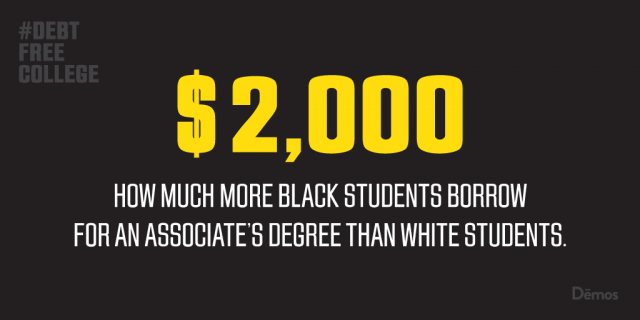While a college degree is widely understood to be an essential tool to compete in today’s tough job market and rise up the economic ladder, diminishing state and federal support of public higher education has sent tuition skyrocketing. As a result, most students now must borrow to attend college—turning what was once a path toward upward mobility into a game of risk.
This risk is not shared equally. The “new normal” of borrowing is particularly acute for Black students—who are more likely to borrow and to borrow at higher amounts than white students due to greater financial need.
The financial risk is considerable: 4-in-10 Black borrowers drop out of college, leaving them with debt but without the benefit of a degree. Around 7-in-10 Black dropouts cite student debt as a primary reason for not completing school, compared to fewer than half of white students.
 Sadly, this was no accident. Racially-biased public policies have prohibited communities of color from accumulating wealth and diminished their ability to contribute as much to their children’s college degree as white parents. At the same time, predatory, for-profit colleges aggressively targeted Black communities, resulting in far too many African-American students taking on debt for a promise that proved elusive and deceptive.
Sadly, this was no accident. Racially-biased public policies have prohibited communities of color from accumulating wealth and diminished their ability to contribute as much to their children’s college degree as white parents. At the same time, predatory, for-profit colleges aggressively targeted Black communities, resulting in far too many African-American students taking on debt for a promise that proved elusive and deceptive.
Our debt-financed higher education system is yet another hurdle that today’s students, especially Black students, have to overcome. Further, indebted graduates report lower levels of financial worth, physical well-being, and show less job satisfaction than those who did not borrow for their undergraduate degree.
Attending college should not be a perilous pursuit. Public policies created this mess, and public policies can fix it. It’s time we rewrite the rules of the game.








